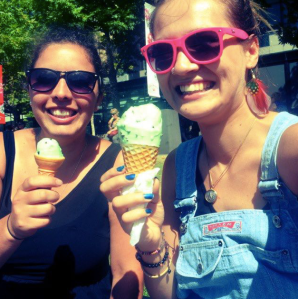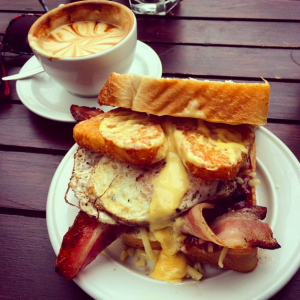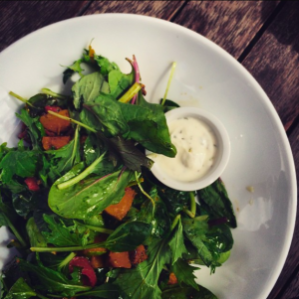 We’ve always been close, carbohydrates and I. I’d be the tea with sugar and a biscuit on the side. I’d be the hazelnut latte. I’d be the extra toast for breakfast, the muffin for elevenses, the large pizza for lunch, the big bar of chocolate as a snack, the second helping of pasta for dinner and the slab of cake for pudding. I was a carb and sugar queen.
We’ve always been close, carbohydrates and I. I’d be the tea with sugar and a biscuit on the side. I’d be the hazelnut latte. I’d be the extra toast for breakfast, the muffin for elevenses, the large pizza for lunch, the big bar of chocolate as a snack, the second helping of pasta for dinner and the slab of cake for pudding. I was a carb and sugar queen.
But then the unthinkable happened. My body turned on itself. One day, my immune system got confused and attacked itself. Everything I knew about my life and my body had been blown to smithereens. Starting fresh is always difficult, but starting fresh with the memories and habits built up over 25 years is the greatest physical and mental challenge I’ve ever faced.
Go to a food establishment and ask about the carbohydrate content in food, or the sugar content in a beverage and you get ‘a look’. They think you’re being fussy. You ask if they have any ‘diet’ mixers, when what you should have said is ‘sugar free’ to reduce the risk of ‘no, sorry love, only full fat’ with a smarmy smile. They think you’re being difficult, that you’re a health conscious types on a fad diet. They think it’s your choice. They don’t understand the ill effect carbohydrates have on your body. They don’t see it as an illness, like wheat to a celiac or dairy to someone who is lactose intolerant. To be completely honest, neither did I until I was diagnosed as a type 1 diabetic.
WHAT’S SO BAD ABOUT CARBS?
 The most simple explanation for why carbohydrates are so problematic diabetic is this: When the body digests food, carbohydrates get broken down into glucose, but a diabetics’ body produces no insulin to convert this glucose into energy. This means that blood glucose levels rise in the bloodstream to a dangerous level. Without insulin, this leads to a whole host of complications later in life – such as heart and blood disease, nerve damage, kidney damage, eye damage, foot damage, skin and mouth conditions and pregnancy complications. I’m not going to go into the details here, but all of these co-morbid conditions run pretty high in type 1 diabetics, and I don’t want to be a part of those statistics. I want to be as healthy as I can for as long as I can.
The most simple explanation for why carbohydrates are so problematic diabetic is this: When the body digests food, carbohydrates get broken down into glucose, but a diabetics’ body produces no insulin to convert this glucose into energy. This means that blood glucose levels rise in the bloodstream to a dangerous level. Without insulin, this leads to a whole host of complications later in life – such as heart and blood disease, nerve damage, kidney damage, eye damage, foot damage, skin and mouth conditions and pregnancy complications. I’m not going to go into the details here, but all of these co-morbid conditions run pretty high in type 1 diabetics, and I don’t want to be a part of those statistics. I want to be as healthy as I can for as long as I can.
HYPERS AND HYPOS
The thing I still struggle to get my head around is the encouragement to continue my life as similar to my pre-diabetic life. Cutting out the high sugar items, of course, like fizzy drinks, sweets, and ice creams – the consumable items that skyrocket a diabetics’ blood sugar to dangerous levels faster than any injecting insulin could counteract. But other carbohydrates are encouraged. I had one appointment with a dietitian after being diagnosed with diabetes, and she said I need carbohydrates, that I’d be hungry without them, that I should opt for complex carbohydrates because of their slower release of energy . Upon this realisation, I struggle to understand why I should continue to eat something that makes me feel physically terrible.
If I consume carbohydrates, and underestimate my insulin, or just have a lot of carbs in one go, I feel physically sick. I feel dizzy, light-headed, wobbly, and like i’m going to pass out. I can’t concentrate and I struggle to hold conversation. I feel tired and get a headache. Now imagine having all of those symptoms at the same time, whilst at work. It’s near impossible and on several occasions I’ve had to sit down until my fast acting insulin kicks in (which takes at least 20 minutes).
On the other hand, If I consume carbohydrates and over estimate, even slightly, the volume of insulin I require, I have a hypo. The sign of a hypo for me is first the shakes and the breathing, which becomes irregular. I feel dizzy, sweaty and find it incredibly hard to concentrate. Exactly two hours after eating carbs and having the insulin kick in, it’s sometimes like being hit in the face with an invisible wall. The wall passed over my body and leaves everything in slow motion. I struggle to move, think, talk and act. I look and sound drunk. Once again, I’m out of action until quickly consumable sugar has been absorbed.
When I eat carbs, my day revolves around food, insulin and trying to maintain balance between high and low blood sugar. There is no ‘normal’ blood sugar. There’s only up or down. Just yesterday I was really hungry whilst out of town, and went to get sushi. The problem was, they had no sashimi or prawns left. Like I said, I was really, really hungry, and in front of me was a shop full off sushi with rice. I decided to wing it and go for a brown rice option salmon sushi for the supposedly lower releasing carbs. I sat down and ate, taking my insulin. I immediately felt sick afterwards, got home and fell asleep. Two hours after eating I woke up and checked my blood sugar. 18.8. I took more insulin as a correction and two hours later, just as I reached town heading for a drink, my blood sugar was at 3.2 and I suffered a horrible hypo. It took a couple of hours getting myself up and feeling better, and by then I’d had enough and just wanted to go home.
ADJUSTING TO A LOW CARB DIET
 Following a low carb diet means swapping easily digestible carbs (bread, rice, pasta, pizza, cookies, potatoes, crackers, tortillas, chips, cake, fruit and sweets) for foods with higher protein and fat content and other foods low in carbohydrates (meat, fish, eggs, vegetables, nuts, seeds, high fat dairy and fats and oils). In other words, following a low carb diet means skipping almost every supermarket aisle.
Following a low carb diet means swapping easily digestible carbs (bread, rice, pasta, pizza, cookies, potatoes, crackers, tortillas, chips, cake, fruit and sweets) for foods with higher protein and fat content and other foods low in carbohydrates (meat, fish, eggs, vegetables, nuts, seeds, high fat dairy and fats and oils). In other words, following a low carb diet means skipping almost every supermarket aisle.
Initially, following low carb diet is extremely difficult. As if the mental torture of thinking about how the hell you’re gonna omit and entire food group from your diet wasn’t enough, the cravings for carbs are still there, and they’re fierce. Carbs are an addiction. After a few days, you carb crash because your body isn’t used to running on fat and protein – you will probably feel irritable, fatigued, shaky and completely drained. But this carb crash will pass and the cravings will fade.
KETOSIS
A really low carb diet may also be referred to as the ketogenic (keto) diet. The keto diet involves consuming around 20 grams of carbs per day, with the aim of burning fat for fuel instead of carbs. After depleting carbs as a source of energy, the body switches to fat. Keto-acid (or ketones) are the by product of incomplete fat metabolism, and these serve as a source of energy. Ketosis is essentially fat adaption, and it can be measured with a simple urine test. As I’m writing this, I’ve just discovered that my body has entered ketosis, and I’ve had blood sugar levels within the healthy range all day long, without insulin and with tasty, satisfying food. I may still be on the higher end of healthy, and I may still be having to correct my blood sugar with the occasional half unit of insulin, but I’m getting there.
MOVING FORWARDS
 I refuse to be the girl feeing her illness with its enemy. Instead, I’m learning to change everything I’ve ever known about eating. I’m now the girl with the naturally sweetened fruit iced tea; The girl with the long black; the girl with bacon and eggs for breakfast, the bunless burger for lunch and the ‘courgetti’ (courgette sliced like spaghetti) for dinner. I’m the girl who goes for fat and protein over a piece of fruit or carbohydrates. I’m the girl with the tasty food; the girl full of energy; the girl determined to be well; and the girl seeking a long and healthy life.
I refuse to be the girl feeing her illness with its enemy. Instead, I’m learning to change everything I’ve ever known about eating. I’m now the girl with the naturally sweetened fruit iced tea; The girl with the long black; the girl with bacon and eggs for breakfast, the bunless burger for lunch and the ‘courgetti’ (courgette sliced like spaghetti) for dinner. I’m the girl who goes for fat and protein over a piece of fruit or carbohydrates. I’m the girl with the tasty food; the girl full of energy; the girl determined to be well; and the girl seeking a long and healthy life.
I may be the girl who has to think about the carbohydrate content of everything I eat – the one checking the labels in supermarkets and frowning at the contradiction between the ‘low sugar’ label on the front and the truth on the back. But I’m still the same girl who climbs mountains, hikes up glaciers, parasails, go karts and who will try anything once, even if it scares her half to death. I’m just the girl trying to normalise her blood sugars to a healthy level on par with her non-diabetic peers…and I will.
So glad I’ve discovered your blog via DBlogWeek and great to read you’re LCHFing with success. It’s something I loosely do for myself after looking into it for my T1 daughter, who’s not that keen on it. Hopefully one day.
LikeLike
Thank you! How old is your daughter?
LikeLike
14 now, was diagnosed when 10.
LikeLike
That’s definitely gotta be a difficult age to adapt to low carb, maybe she’ll try it when she’s a bit older.
LikeLike
My 9 yr old was diagnosed 7 months ago and we’ve been following a LCHP since around 3 weeks after diagnosis. Her A1c is now 5.2% down fro 14! Thank you for such a positive and inspiring blog – i love your attitude – you’re an absolute inspiration.
LikeLike
That’s amazing! Well done! I hope she’s managed to adjust okay! I think once you get over the initial shock and withdrawals of eliminating an entire food group from your diet, you realise not only how inessential it was, but how much better and satisfied you feel without it! I hope she’s enjoying her new found lease of life 🙂 Thank you so much!
LikeLike